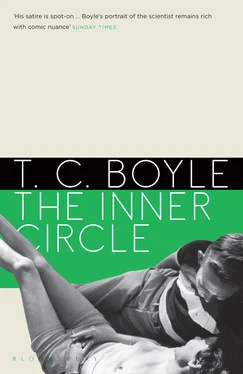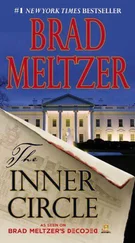T. Boyle - The Inner Circle
Здесь есть возможность читать онлайн «T. Boyle - The Inner Circle» весь текст электронной книги совершенно бесплатно (целиком полную версию без сокращений). В некоторых случаях можно слушать аудио, скачать через торрент в формате fb2 и присутствует краткое содержание. Год выпуска: 2006, Издательство: Bloomsbury UK, Жанр: Современная проза, на английском языке. Описание произведения, (предисловие) а так же отзывы посетителей доступны на портале библиотеки ЛибКат.
- Название:The Inner Circle
- Автор:
- Издательство:Bloomsbury UK
- Жанр:
- Год:2006
- ISBN:нет данных
- Рейтинг книги:4 / 5. Голосов: 1
-
Избранное:Добавить в избранное
- Отзывы:
-
Ваша оценка:
- 80
- 1
- 2
- 3
- 4
- 5
The Inner Circle: краткое содержание, описание и аннотация
Предлагаем к чтению аннотацию, описание, краткое содержание или предисловие (зависит от того, что написал сам автор книги «The Inner Circle»). Если вы не нашли необходимую информацию о книге — напишите в комментариях, мы постараемся отыскать её.
The Inner Circle — читать онлайн бесплатно полную книгу (весь текст) целиком
Ниже представлен текст книги, разбитый по страницам. Система сохранения места последней прочитанной страницы, позволяет с удобством читать онлайн бесплатно книгу «The Inner Circle», без необходимости каждый раз заново искать на чём Вы остановились. Поставьте закладку, и сможете в любой момент перейти на страницу, на которой закончили чтение.
Интервал:
Закладка:
“Just us? That is odd. Because Prok, not to my knowledge anyway, has never given a musicale with fewer than twenty or thirty guests — that’s the whole point, to educate people.”
“And to show off.”
This seemed to suck the wind out of the conversation. I wouldn’t hear any criticism of Prok, and especially not from one of my own coworkers and colleagues, and I gave him a look to warn him off.
Rutledge shrugged, threw a furtive glance up the hall, then came back to me. “Listen, John, loyalty is one thing, don’t get me wrong, but he’s not above criticism, you know. He can be a real pompous ass at times, with his obbligato and his menuetto and largo e cantabile and all the rest of it, and then there’s that look he gets on his face, the same look he gets when he comes, like a penitent nailed to the cross.”
I felt as if I’d been slapped across the face. “Listen, Rutledge — Oscar—” I said, and my voice went cold, “I have to tell you I don’t feel comfortable with any sort of criticism or bad-mouthing of Prok, I just don’t, I’m sorry, so please, in future, if you would just keep it to yourself—”
“But you’ve seen it. You’ve seen that look on his face. You’ve been on the receiving end of it, haven’t you? Well so have I. It’s part of the job, isn’t it?”
“No,” I said. “No, I don’t want to talk about this.”
He was still watching me, holding my eyes as if he were taking my history. “And Ted, of course. Ted’ll be there,” he said. “With his camera.”
The sunday came, wind-whipped and bathed in a tentative March sunshine that hinted at better times ahead. Crocuses were blooming, pussy willows, azaleas. Townspeople were out in their yards, raking the grass, thinking about where to string the hammock, and the students were everywhere, crowding the sidewalks in clusters of three and four, their jackets open to the waist, grinning and frolicking and shouting to one another as if it were May already, as if it were June and finals were over. It was kite-flying weather, and though I hadn’t flown a kite in twenty years, Iris and I bought a cheap paper version at a novelty shop and took John Jr. to the park to launch it. All well and fine. But before we’d gone to the park we’d done something even more out of the ordinary, and I didn’t know how I felt about it or what it meant exactly. We went to church. It was Sunday, and we went to church.
As I’ve said, Iris was raised in the Roman church, but she’d given it up in college, and certainly I myself had neither the faith nor reason to enter any ecclesiastical structure of any denomination. But Iris had awakened that morning with an idea fixed in her head — we were going to church because it was Lent and because she missed the ritual of it, the mumble of Latin, the immemorial fragrance of the censers — and I couldn’t argue with her. I wouldn’t want to say that she was reverting to childish things because that wouldn’t be fair to her, and yet she’d begun to write long missives to her mother almost daily, about what I couldn’t imagine, and she had taken up the clarinet again … and baking. She told me she’d loved to bake as a girl. And now, over breakfast — eggs poached just the way I like them, lean strips of bacon, crude crumbling hunks of a homemade bread that hadn’t risen — she’d announced that we were going to church. The whole family.
“Church?” I’d said.
“That’s right.”
“But why? What are you thinking? You know that I don’t, well — I’ve got better things to do with my day off, don’t you think?”
“Because I miss it, that’s why. Shouldn’t that be enough? Can’t you do anything for me, just for me, just once? And for John Jr.?” We were at the kitchen table, the aforementioned boy nearly four years old now and perched on the edge of his booster seat, making an improvisatory scramble out of his own eggs. She paused to wipe his chin, the cheerful yellow splotch there, and then came back to me. “He’s growing up a pagan. Doesn’t that bother you?”
“No,” I said, “not at all.”
“You know what the other mothers say? The other children?”
It would have been useless to point out that I didn’t care in the least what the other mothers might say or that Prok would have a fit if he knew that I’d been within fifty feet of a church, temple, tabernacle or mosque — he hated them all, all religions, with equal fervor. Religion was antithetical to science. The religious simply couldn’t face the facts. They were living in the Dark Ages, et cetera. I couldn’t have agreed with him more, but Iris wanted to go to church, and that was all that mattered.
I will say that the experience was at least mildly interesting from a sociological perspective. The women had their heads covered, most with spring hats, but a good number with simple black or white scarves knotted under the chin, and the men — and the children too — were turned out in their best in deference to the God they’d come to worship. There was the smell Iris had spoken of — some sort of herb or aromatic gum reduced over hot coals, a holdover no doubt from the days when the devotees went largely unwashed and it was thought that contagion was bred spontaneously out of the miasma of foul air — and a whole panoply of ritual that Iris performed with a simple grace that stirred me more deeply than I wanted to admit. I watched her kneel, cross herself, dip her fingers in the holy water and let her lips move along with the priest’s in the ventriloquism of rapture, even while John Jr. gurgled and writhed at her side and she turned to hush him. In a way, the whole thing was quite beautiful, not that it meant anything and not that we’ve been back since — or not that I’ve been back — but it was like being at a concert, I suppose, when you’re free to let your mind empty itself and wander where it will.
Yes, and then we went to the park and John Jr. ran wild with the release of it, like a puppy let off the leash, and we had a picnic, though the wind made its presence felt whenever the clouds obscured the sun, which they did, off and on, all afternoon. We’d bought a box kite and assembled it at home, despite the fact that studying directions on a sheet of paper and translating them into action wasn’t my strong suit, and when I ran with it twirling and twisting above my head, my son let out a whoop of the purest, elemental joy. I paid out the line and felt the tug of nature on the other end, and it goes without saying that the sensation brought me back to my own childhood. “I want,” my son said. “Give me, Daddy. Me, me!” And I sat myself down in the naked grass with John Jr. in my lap and together we held tight to the string.
It might have been that day when he lost hold of the kite, or maybe it was another occasion, another day, another year. But I remember being confident enough to let him take it himself, to feel that mysterious suspensory tug all on his own and master it, and he ran with the thing, giggling like a maniac, paying out string, getting cockier by the minute — and that was good, all to the good — until there was no string left. Before I could reach him, before I could leap forward and snatch at it, the thing was gone, receding in the sky on its bellying tether as if we’d never had hold of it at all.
Then there was dinner, a roast turkey Iris had put in the oven before we went out, the smell of it heavy on the air as we came in the door, and the fire I made to take the chill out of our fingers and toes. We dropped John Jr. at the sitter’s — Were we going to be late? she wanted to know. No, we didn’t think so, not too late — and then drove over to Prok’s.
As it turned out, we were the first to arrive, which was unusual in itself. Mac took our coats, and Prok, absorbed in mixing cocktails — we were having Zombies, I saw — called out a brusque greeting from the chair he’d pulled up to the coffee table in the inner room. There was no fire that night, and yet the house was warm, bearing the faint olfactory traces of radiated heat, of the furnace in the basement and its conduit of pipes and radiators, and that was odd, given Prok’s Spartan tastes. He rose to greet us as we came into the room, a peck to the cheek for Iris and a handclasp and his famous smile for me, and it was like coming home all over again, arriving at a foreordained destination, the place I was meant to inhabit in my fatherless transit of the planet. Prok’s house. Prok and Mac’s. A wave of emotion swept through me, and I can’t say why or what it was about that particular moment that moved me so, though it had to do with continuity, I think, and with my sudden apprehension of it. I suppose Prok would have classified it as a chemical reaction, a fluctuation in the hormonal levels originating in the endocrine glands. Just that, and nothing more.
Читать дальшеИнтервал:
Закладка:
Похожие книги на «The Inner Circle»
Представляем Вашему вниманию похожие книги на «The Inner Circle» списком для выбора. Мы отобрали схожую по названию и смыслу литературу в надежде предоставить читателям больше вариантов отыскать новые, интересные, ещё непрочитанные произведения.
Обсуждение, отзывы о книге «The Inner Circle» и просто собственные мнения читателей. Оставьте ваши комментарии, напишите, что Вы думаете о произведении, его смысле или главных героях. Укажите что конкретно понравилось, а что нет, и почему Вы так считаете.












